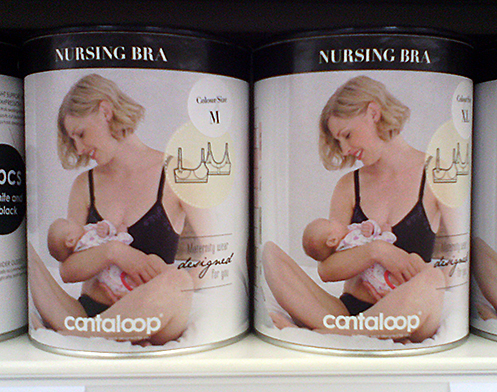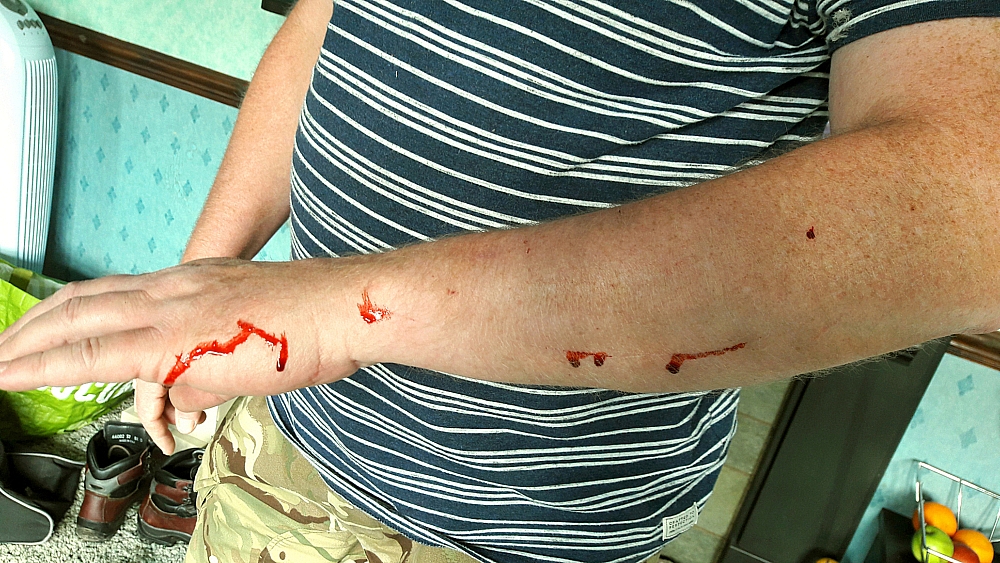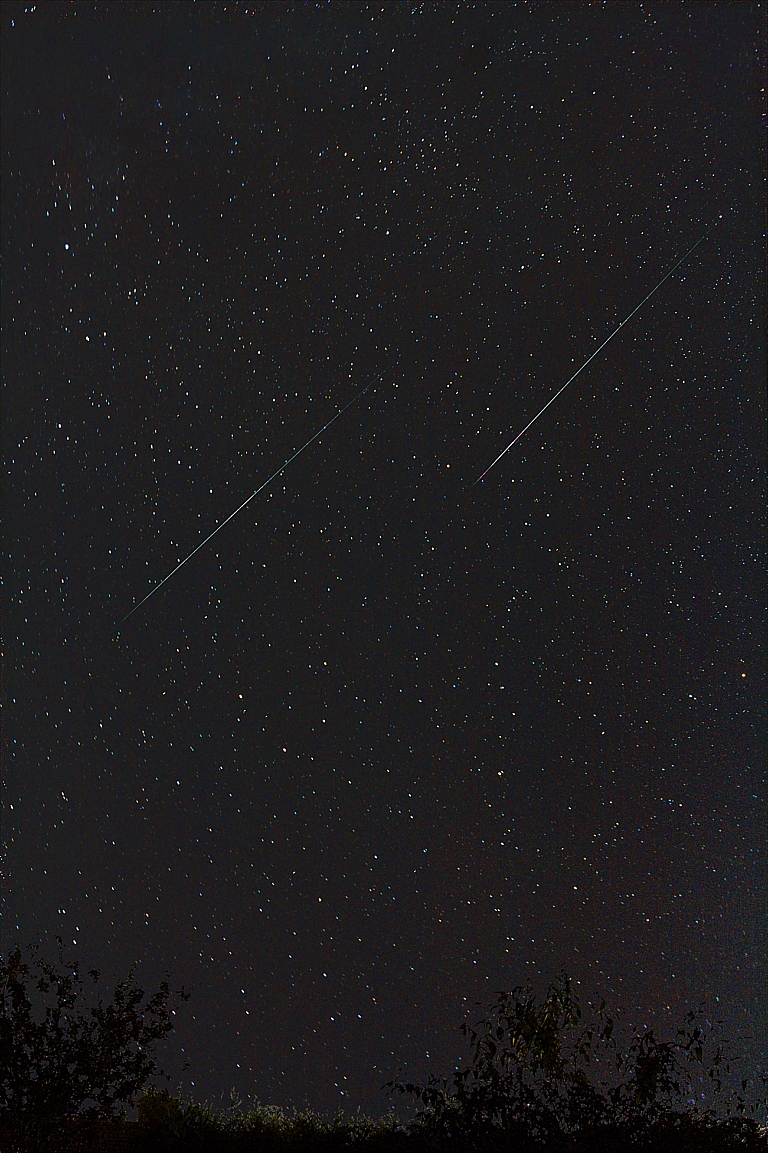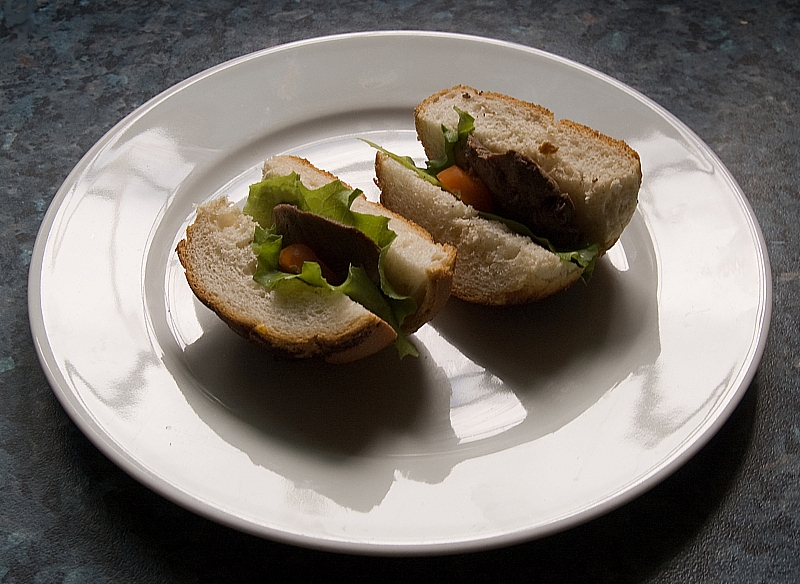As brand names go, this one's fairly apt:

I wonder if her name's Melanie?
From the 5th to the 13th of August I managed four nights watching and photographing the Perseids. 1799 pics later and I'd caught nine good meteors on camera, and I'd seen about 75 while lazing on the garden bench. Bearing in mind the low hourly rates, several bouts of cloudiness and the rising Moon, nine on camera is about as many as I would have expected.
Here's the best pic of the bunch, captured on the 12th - looking towards the zenith, West is more-or-less downwards. Click it to see a bigger version:
A pair of Perseid meteors heading west-southwest.
So, after 12 hours, they should look like this:
Now it's time to peel them off and flip them over, a process helped by having those overhanging lips. They'll still be quite squidgy but with care they should peel off cleanly with flat shiny bottoms, if they don't then they need a bit longer.
After the flip you have to ask yourself which you prefer - bendy or stiff. Either way, don't bother with the drying sheet, it's not necessary. Another 8 hours should produce wedges which, when cooled, are bendy and chewy, if you like a bit of a crunch go for 12 hours instead. Bear in mind that they'll still be bendy until they are cool, so don't be tempted to go beyond dehydration and end up with dessication.
They should end up something like this:
Bendy on the left, stiff on the right
Now, if you can resist scoffing them, you can bag them up and store them.
Or you can experiment with them - I've been quartering them and adding them to pots of Oats2Go porage, they rehydrate well when the hot water is added.
Enjoy!
I hate carpet-grippers!

Well, technically, the pic shows a thrupenny lunch - I'd already scoffed the first half of it before someone suggested that I should take a pic.
Cheap, light and healthy - the lettuce, the tomatoes, the spring onion and the Woodpigeon breasts came FOC from our garden, the bread came from Asda's marked-down stash. They went down well with a little olive oil.
There are a couple of important bits here - which oil to use on your banana, and how to apply it. The rest is innuendo-free.
After trying a few oils, I've found that coconut oil is the best option. There are quite a few options available in supermarkets, the best I've used so far is Morrisons Liquid Coconut Oil Blend which has 80% fractionated coconut oil, the rest is sunflower oil and some flavouring. It's cheap, easy to use, and a small bottle lasts for ages - and it's the magic ingredient. Don't be tempted to use the waxy "solid" oil - it's a pig to work with and doesn't yield better results. During the drying process most of the oil is driven off, leaving only a hint of coconut which lets the banana taste come through really well. As a side benefit, it makes the house smell nice during the drying phase.
The oiling method is quite simple, the main thing is to get full coverage of your banana using the smallest possible amount of oil. Peel the over-ripe bananas (if they are starting to blacken that's a good thing) and use a brush or clean fingers to apply the tiniest amount of oil to the surface of them. Leave them until the oil has soaked in, which usually takes about 10 minutes tops - if it takes any longer you've used too much oil.
Of course, the skins and any bad bits go into one of the compost bins to feed next year's spuds. Nothing's wasted.
Peeled
Oiled
After that, use a chopping knife to cut the bananas into suitably sized/shaped chunks. I prefer angled cuts because having an overhanging "lip" on the chunks helps when peeling them off the drying sheet during the drying process - more on that later.
Chopped
Put the chunks onto drying sheets in the dehydrator trays. Nowadays we use proper silicone sheets but baking parchment sheets work just as well. Avoid using greaseproof paper - it tears and leaves bits stuck to the chunks. Don't be tempted to oil the sheets, the chunks will stick hard and will be pulled apart when it's time to peel them off to turn them over. In theory, after the drying process has started, the oil helps a skin to form on the uncut surface. The soaked-in oil then has to migrate through the inside, forcing the internal water out of the oil-free cut faces.
Now you should put the kettle on and make yourself a well-deserved cuppa while leaving the trays uncovered until the chunks just start to blacken, as cut bananas do. 10 - 20 minutes should be enough, much depends on how over-ripe they are and how warm the room is.
Blackening
After that, stick the trays in the dehydrator at about 70C for 12 hours, re-ordering the stack every so often to ensure that they each get equal amounts of heating and drying.
I'll post again when that bit's finished.


